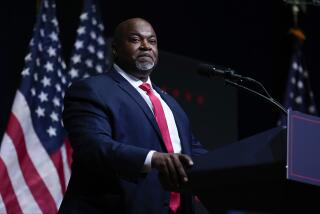On the Road With Jerry--Next Stop: Madness
SACRAMENTO — It was worse than a nightmare; it was a real life horror story. I’m talking about traipsing after Jerry Brown through a few primaries as a reporter.
The experience was all too reminiscent of Brown’s tenure as California’s governor: disorganized, though never dull; bouncing about with all the stability of a pinball. Decisions made on a whim and at the last minute.
“We are not disorganized. Our campaign transcends understanding,” Jacques Barzaghi, Brown’s longtime aide-de-camp and present field director, recently told the New York Times. “I love discipline . . . but I can see the beauty in chaos.”
Sorry, Jacques. There is nothing of beauty in this muddle.
Rarely is the traveling press corps given the day’s itinerary until the morning. It usually is midnight before reporters even learn when to set their alarms. On the road in Connecticut, Wisconsin and Upstate New York, the indecisive staff normally did not choose a hotel for the night until late afternoon.
In New Haven, Conn., reservations were booked and canceled at two hotels after 5 p.m. A third hotel finally was settled on, but only after a disgusted CBS-TV field producer took matters into her own hands and reserved 15 rooms herself.
One lasting memory will be of being abandoned in a parked minivan during a heavy snowstorm while the driver was detached to keep an eye on Brown’s clothes as he jogged for an hour around an indoor track. This happened one afternoon in New Haven while I was desperately trying to find a place to write and send a daily story to my editors in Los Angeles.
Another will be of starting off this adventure at the Sacramento airport and not knowing where to fly because Brown had not yet decided in which town to spend that night. I guessed correctly it would be Madison, Wis., where we all groggily climbed onto the Brown bus the next morning at 4:15 to begin the campaign day.
Then there was every campaign reporter’s worst nightmare: being stranded at an isolated spot. I and a colleague from Newsday were deserted at dusk while we filed our stories from a Utica, N.Y., college where Brown had just spoken. As we were filing, the candidate and his caravan headed off for New York City, 250 miles away. Fortunately, we talked a campus policeman into driving us 20 miles to the local airport, where we intercepted the chartered plane just before it taxied down the runway.
Until recently, Brown complained loudly about being stuck “in the deep hole of media obscurity.” TV networks and major newspapers ignored him, he yelped. But one problem was--and still is--that Brown makes it extremely difficult for the news media to cover him.
Newspaper stories and TV footage do not just evolve, to use a favorite Brown word. A reporter does not merely pick up a telephone and emit words from a computer tongue. There must be an hour or two to write on a laptop computer--perhaps on a bus or airplane, if not in a hotel room--and a telephone capable of transmitting the computer’s signal. TV film does not magically appear in a studio. It must be taken there, usually by a courier. All this requires planning, which is virtually impossible around Brown.
Brown’s rationale is that this is a “people’s campaign,” funded with contributions of $100 or less and operated mostly by volunteers. But, in fact, he ran state government the same way when money and expertise were plentiful.
As governor, Brown’s itineraries were fiction. He was late to almost everything and kept people with appointments waiting for hours. Rarely did he call Cabinet meetings, so the Cabinet started meeting by itself just to try to find out what the Administration was doing.
“Nothing was ever done until the last minute,” recalled chief of staff B. T. Collins, now an assemblyman. “The reason I became such a sought-after speaker was that people could not stand the rudeness and frustration of the governor not telling them whether he would accept their invitation.”
As last Tuesday’s voting approached and the Brown entourage of press, family and hangers-on swelled to a planeload--a bucking 40-year-old turboprop, compared to Bill Clinton’s sleek 737 jet--Barzaghi called for organizational help from three veterans of past Brown campaigns: Tom Quinn, Llew Werner and Don Lesser.
Things were less chaotic for awhile. But then a press bus got lost heading for Brooklyn and wound up in the Bronx, missing Brown’s biggest public event on election eve in New York City. The next morning, a new bus driver refused to budge until the campaign paid him $925 up front, and the press missed another event.
Quinn, Werner and Lesser have thrown up their hands and come home.
If Brown does not run any better in Pennsylvania on April 28 than he did in New York--finishing third in a two-man race--he probably should come home, too, assuming somebody can organize the trip.
More to Read
Get the L.A. Times Politics newsletter
Deeply reported insights into legislation, politics and policy from Sacramento, Washington and beyond. In your inbox three times per week.
You may occasionally receive promotional content from the Los Angeles Times.











